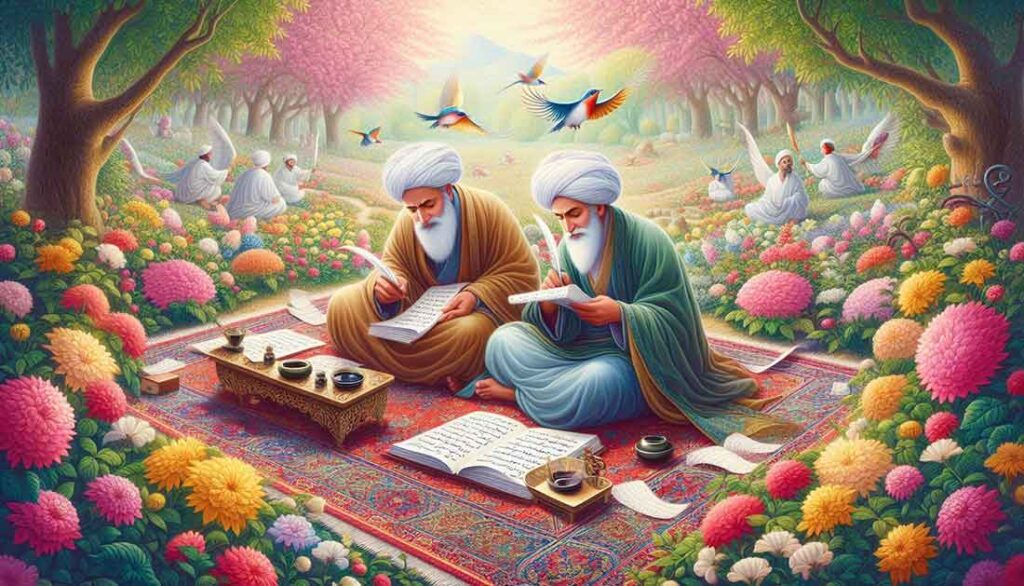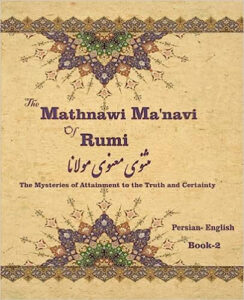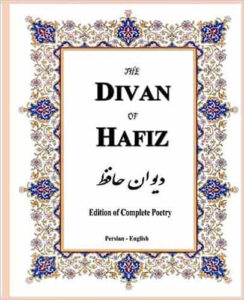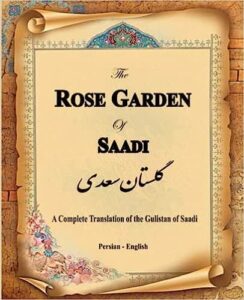Table of Contents
TogglePersian Influence
With its rich heritage and profound themes, Persian literature has significantly influenced Western literary traditions. The works of Persian poets like Rumi, Hafez, Saadi, and Omar Khayyam have resonated deeply with Western poets, inspiring them to explore new themes, styles, and philosophical insights. This article delves into how Persian literature has shaped the works of Western poets and contributed to the broader literary landscape.
Persian literature, known for its intricate beauty and deep philosophical undertones, has captivated readers and writers worldwide. Western poets, in particular, have drawn inspiration from Persian poetry, finding it a source of profound wisdom and aesthetic delight. The cross-cultural exchange between Persian and Western literary traditions has enriched both, leading to a fusion of ideas and artistic expression.
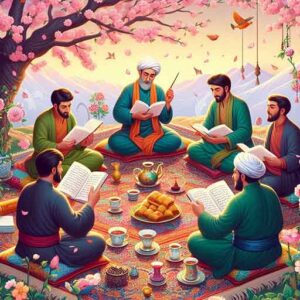
Historical Context of Persian
Early Translations and Discoveries
The introduction of Persian literature to the Western world began in earnest during the 18th and 19th centuries when scholars and translators started bringing the works of Persian poets to a broader audience. Sir William Jones, an English philologist and orientalist, pioneered in translating Persian poetry into English. His translations opened the door for many Western readers to explore the rich tapestry of Persian literary traditions.
Romanticism and Orientalism
The Romantic era saw a surge of interest in Oriental cultures and literature. Western poets and writers were fascinated by Persian poetry’s exotic themes, mystical elements, and lyrical beauty. This fascination was part of a broader cultural movement known as Orientalism, which sought to understand and represent Eastern cultures through Western eyes.
Essential Persian Poets and Their Impact
Rumi
Jalal al-Din Muhammad Rumi, commonly known as Rumi, is one of the most influential Persian poets. His mystical and spiritual poetry has touched the hearts of readers worldwide. Rumi’s exploration of love, the divine, and the human soul has resonated deeply with Western poets, inspiring them to delve into similar themes.
Example:
- An American poet, Walt Whitman was influenced by Rumi’s celebration of the human spirit and the interconnectedness of all beings. Whitman’s “Leaves of Grass” echoes Rumi’s mystical vision and embrace of the universal.
Hafez
Hafez of Shiraz, another towering figure in Persian literature, is known for his lyrical ghazals exploring themes of love, wine, and spiritual transcendence. Hafez’s poetry is characterized by its emotional depth and intricate use of metaphor.
Example:
- Goethe, the German poet, was profoundly influenced by Hafez. His “West-Eastern Divan” is a testament to this influence, blending Western and Eastern literary traditions and celebrating the universal themes found in Hafez’s poetry.
Saadi
Saadi Shirazi is celebrated for his works “Bustan” (The Orchard) and “Gulistan” (The Rose Garden), which combine prose and poetry to convey moral and ethical teachings. Saadi’s wisdom and humanism have had a lasting impact on Western literature.
Example:
- Ralph Waldo Emerson, an American transcendentalist, admired Saadi’s works for their philosophical depth and practical wisdom. Emerson’s essays and poems reflect the ethical and spiritual insights he gleaned from Saadi’s writings.
Omar Khayyam
Omar Khayyam, known for his “Rubaiyat” (quatrains), has captured the imagination of Western readers with his existential musings and celebration of life’s fleeting moments. Khayyam’s poetry often grapples with themes of fate, mortality, and the search for meaning.
Example:
- Edward FitzGerald, an English poet, popularized Khayyam’s work through his famous translation of the “Rubaiyat.” FitzGerald’s rendition brought Khayyam’s philosophical reflections to a broad Western audience and influenced many subsequent writers.
Themes and Stylistic Influences
Mysticism and Spirituality
The mystical and spiritual dimensions of Persian poetry have profoundly influenced Western poets. Themes of divine love, the soul’s journey, and the quest for truth resonate in many Western writers who have sought to explore similar spiritual landscapes.
Love and Human Experience
Persian poetry’s nuanced exploration of earthly and divine love has inspired Western poets to delve into the complexities of human emotions. The lyrical beauty and emotional intensity of Persian poetry have enriched the expressive range of Western literature.
Philosophical Reflection
The philosophical and existential themes found in the works of Persian poets like Omar Khayyam and Saadi have provided Western poets with a rich source of contemplation. Questions about fate, the nature of existence, and the pursuit of wisdom are central to Persian and Western poetic traditions.
Symbolism and Imagery
The symbolic and metaphorical richness of Persian poetry has influenced the stylistic approaches of Western poets. The use of vivid imagery, intricate metaphors, and allegorical language in Persian literature has expanded the imaginative horizons of Western poetry.
Contemporary Resonance
Modern Western Poets
Contemporary Western poets continue to draw inspiration from Persian literature. Persian poetry’s timeless themes and universal appeal resonate with modern readers and writers, fostering a continued exchange of ideas and artistic innovation.
Cross-Cultural Literary Dialogues
The ongoing translation and study of Persian literature in the West contribute to a vibrant cross-cultural literary dialogue. Scholars, poets, and readers engage with Persian poetry, finding in it a source of inspiration and a bridge between cultures.
FAQs
How did Persian literature influence Western poetry during the Romantic era?
During the Romantic era, Western poets were fascinated by Persian poetry’s exotic themes, mystical elements, and lyrical beauty. This fascination led to a surge of interest in Oriental cultures and literature, influencing the themes and styles of Western Romantic poetry.
Who are some critical Persian poets who influenced Western literature?
Essential Persian poets who influenced Western literature include Rumi, Hafez, Saadi, and Omar Khayyam. Their works have inspired Western poets with profound themes, lyrical beauty, and philosophical insights.
What themes in Persian poetry resonate with Western poets?
Themes such as mysticism and spirituality, love and human experience, philosophical reflection, symbolism, and imagery resonate with Western poets and enrich Western literary traditions.
How has Persian literature influenced modern Western poets?
Modern Western poets continue to draw inspiration from Persian literature’s timeless themes and universal appeal. The ongoing translation and study of Persian poetry foster a continued exchange of ideas and artistic innovation.
What is the significance of Edward FitzGerald’s translation of Omar Khayyam’s “Rubaiyat”?
Edward FitzGerald’s translation of Omar Khayyam’s “Rubaiyat” popularized Khayyam’s work in the West, bringing his philosophical reflections to a broad audience and influencing many subsequent Western writers.
How does Persian literature contribute to cross-cultural literary dialogues?
Persian literature contributes to cross-cultural literary dialogues by providing a source of inspiration and a bridge between cultures. The translation and study of Persian poetry in the West promote a vibrant exchange of ideas and artistic expression.
The influence of Persian literature on Western poets is a testament to the universal appeal and profound wisdom of Persian poetry. Through themes of love, mysticism, philosophy, and rich symbolism, Persian poets have left an indelible mark on Western literary traditions. This cross-cultural exchange continues to inspire and enrich the works of poets and writers worldwide, fostering a deeper understanding and appreciation of our shared human experience.

